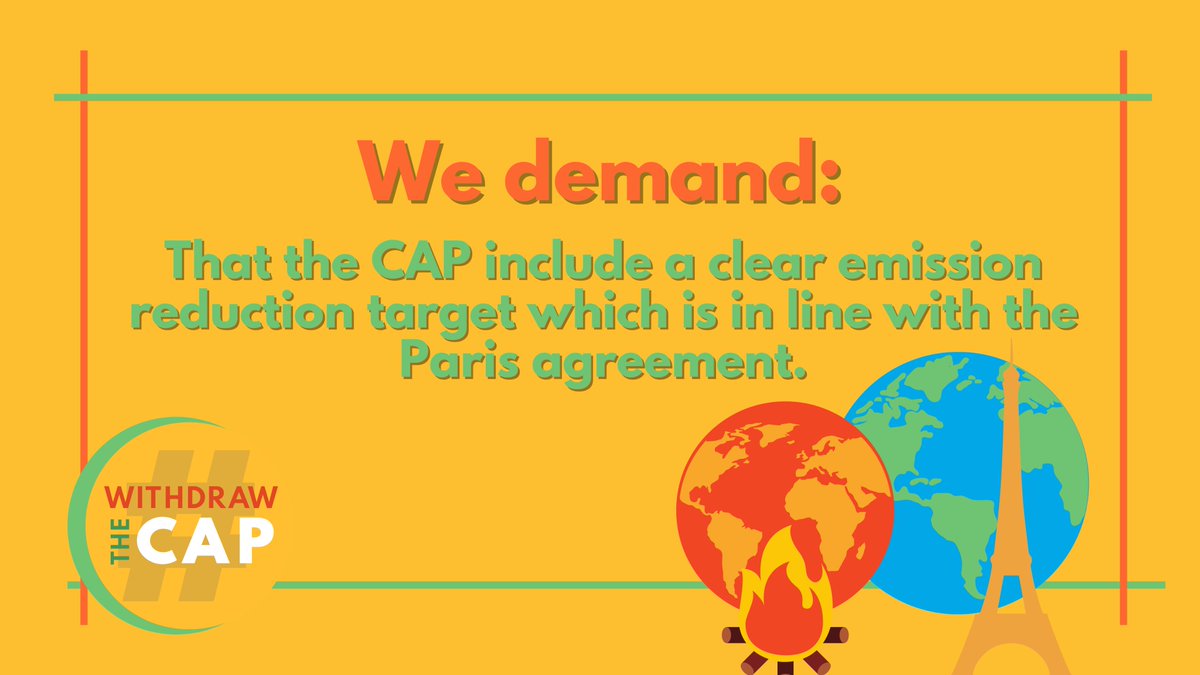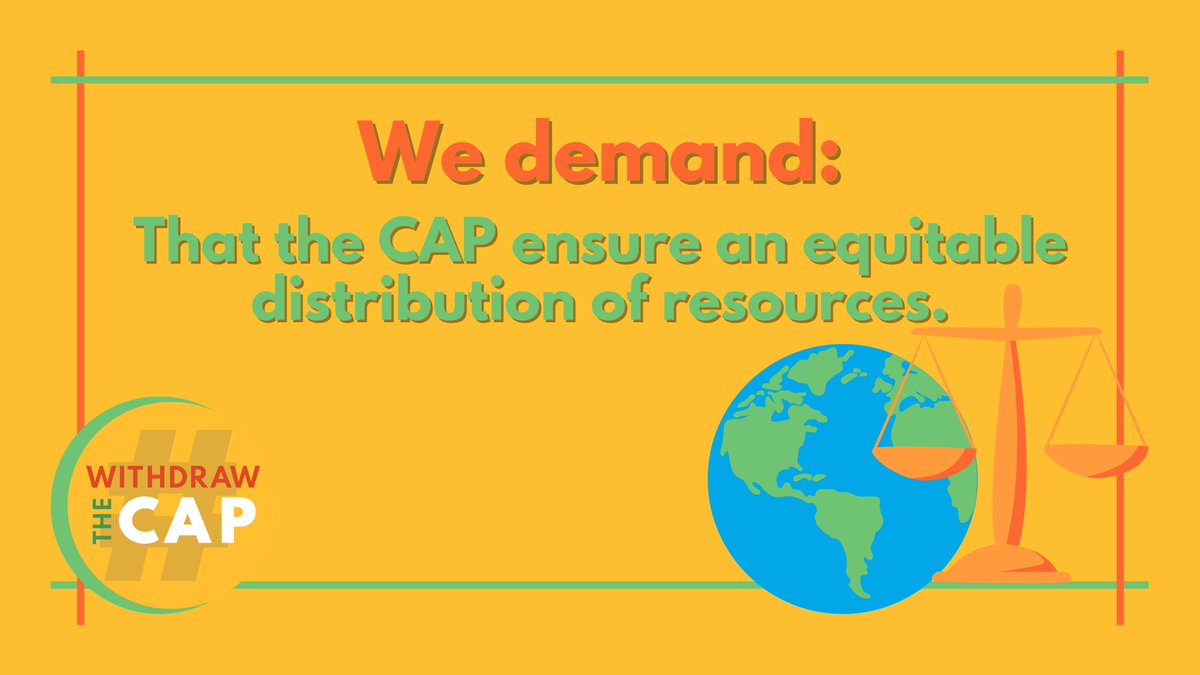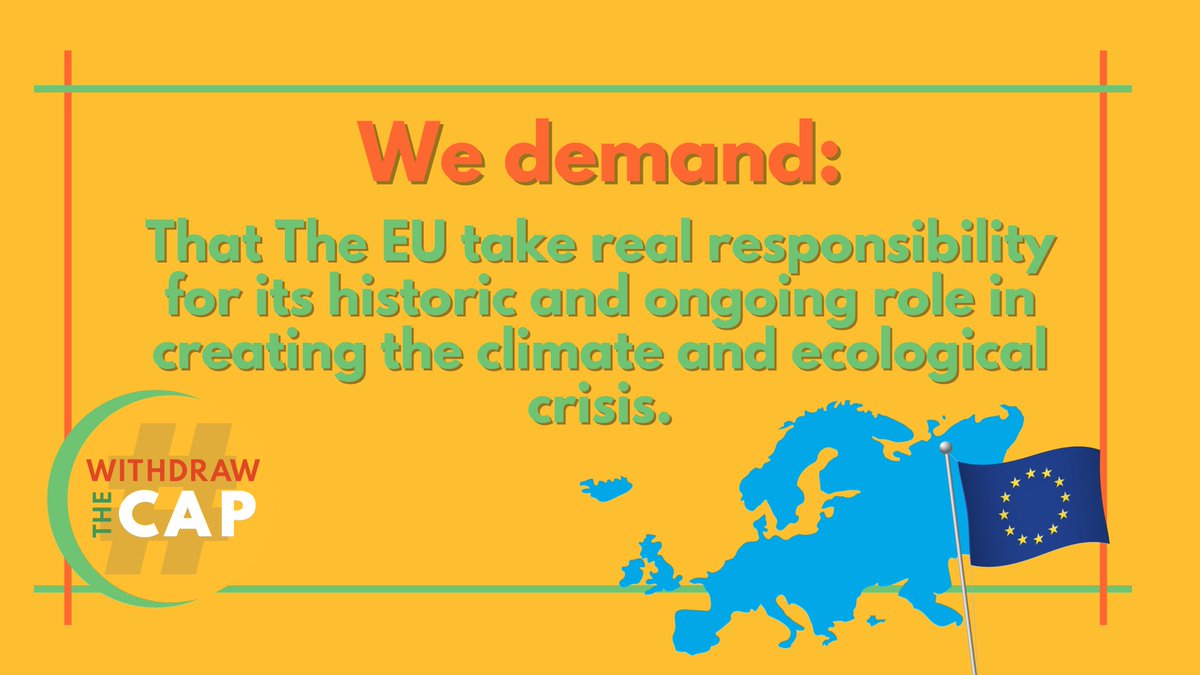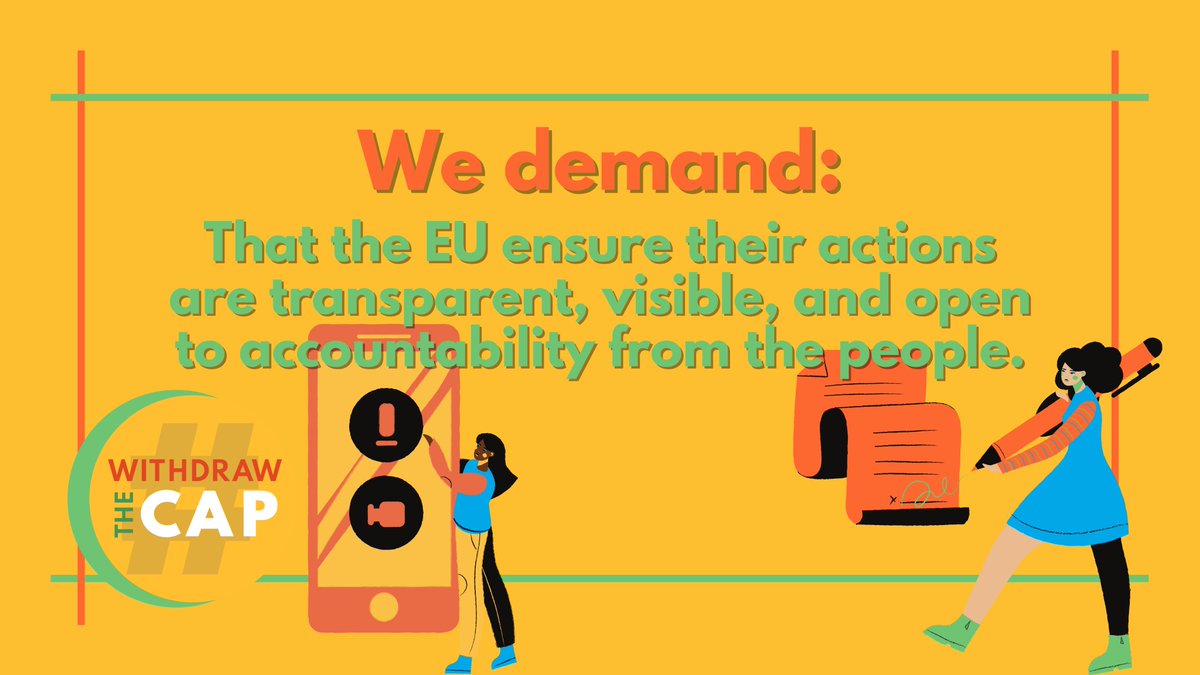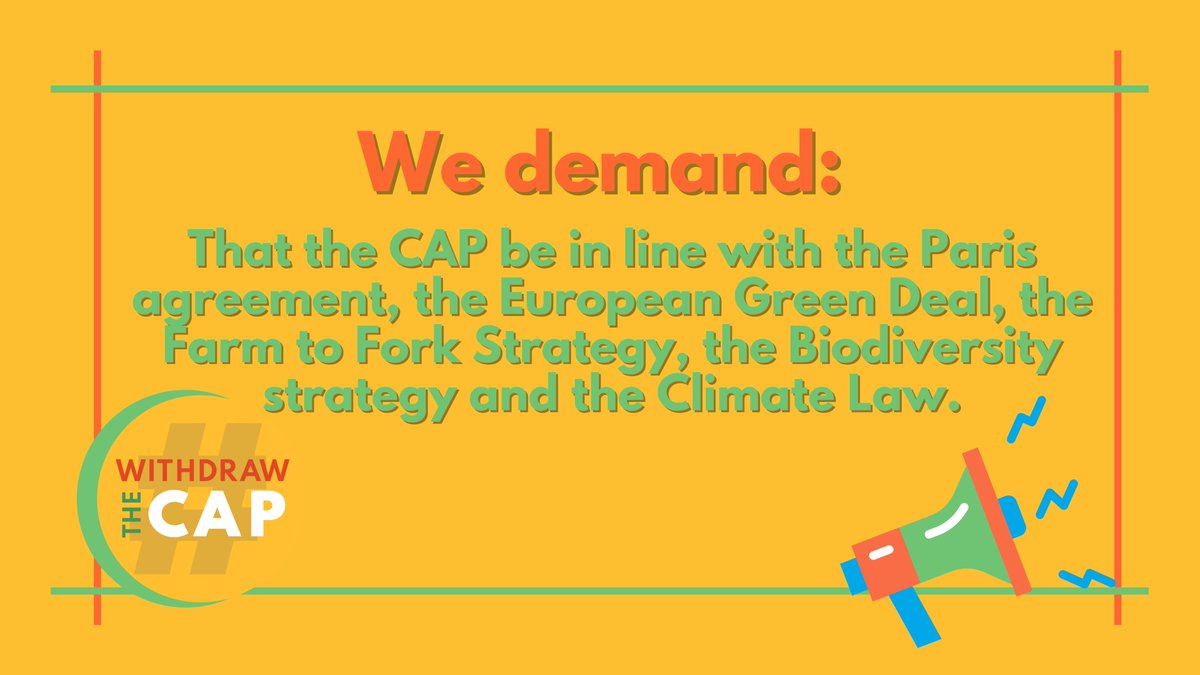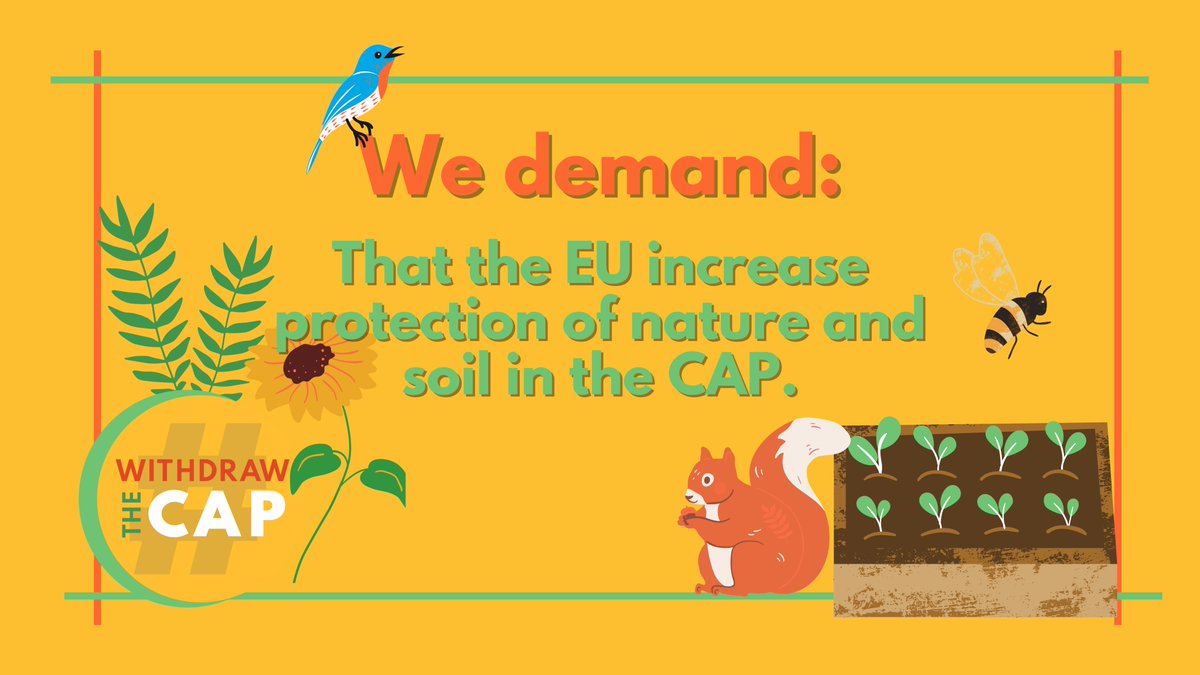A lot of people seem to think we don't want any CAP at all - this is not true, we want a CAP which is sustainable and which supports climate justice. These are our demands (a thread  )
)
 )
)
1) We demand that the CAP include a clear emission reduction target which is in line with the Paris Agreement.
The only emission reduction target included in the original CAP reform (amendment 808, part 2), which asked for a 30% decrease in emissions within the EU’s -
The only emission reduction target included in the original CAP reform (amendment 808, part 2), which asked for a 30% decrease in emissions within the EU’s -
- agricultural sector by 2030, was voted down in negotiations. An acceptable CAP must include a clear emission reduction target that is in line with the Paris agreement.
2) We demand that the CAP ensure an equitable distribution of resources.
About 50% of the farmland in the EU is rented, meaning that CAP subsidies often go to the landowners rather than the farmers themselves. In fact, as Vice-President Timmermans has also pointed out, 80% -
About 50% of the farmland in the EU is rented, meaning that CAP subsidies often go to the landowners rather than the farmers themselves. In fact, as Vice-President Timmermans has also pointed out, 80% -
of the subsidies are paid to only 20% of the farmers, especially to big agriculture holdings. Resources should be distributed based on need rather than based on the number of hectares, as the current solution prioritizes intensive agriculture over smaller farms.
3) We demand that The EU take real responsibility for its historic and ongoing role in creating the climate and ecological crisis.
Since the beginning of colonialism, European states and companies have been exploiting and profiting off people and nature in other parts of the -
Since the beginning of colonialism, European states and companies have been exploiting and profiting off people and nature in other parts of the -
- world. Given the EU’s historic and current high resource use and emission rates as well as its financial abundance, the EU has an especially big responsibility in acting against the climate and ecological emergency. This includes setting more ambitious targets within emission -
reduction + biodiversity protection, as well as recognizing how decisions made in Europe affect communities on other continents in an interconnected world. The safety of those the most impacted by the affects of climate change and environmental destruction must be prioritized.
4) We demand that the EU ensure its actions are transparent, visible, and open to accountability from the people.
The CAP makes up for about 35% of the EU’s budget and has a considerable impact on people in and outside of the EU. It is therefore crucial that stakeholders -
The CAP makes up for about 35% of the EU’s budget and has a considerable impact on people in and outside of the EU. It is therefore crucial that stakeholders -
including organisations and people from civil society, be informed of and included in the negotiations. In the case of the current proposed CAP, small farms (who would be the most negatively affected by the CAP) were not adequately represented in the decision making process.
An example of how this can be done better is the Escazú agreement. Other related issues include conflict of interest (many MEPs who voted on the CAP directly or indirectly benefit from CAP subsidies) and the fact that the voting was preponed on short notice.
5) We demand that the CAP be in line with the Paris Agreement, the European Green Deal, the Farm to Fork Strategy, the Biodiversity Strategy and the Climate law.
In other words, we demand the EU keeps its promises.
In other words, we demand the EU keeps its promises.
The EP voted down all amendments referring to the Farm to Fork Strategy, the Biodiversity Strategy and the Climate Law (amendments 876-878 and 1191-1193), and the proposal to integrate concrete Green Deal targets into the CAP (amendment 1199) was voted down by the Council.
6) We demand that the EU increases the protection of nature and soil in the CAP.
Lastly, it is paramount that the EU act radically to increase the protection of nature through the CAP. This would include, but is not limited to:
Lastly, it is paramount that the EU act radically to increase the protection of nature through the CAP. This would include, but is not limited to:
- Increased protection of wetlands, especially peatlands.
- Expansion of Natura 2000 areas
- Increased support for organic farming (the proposal to increase support for organic farming (amendment 832) was rejected).
- Expansion of Natura 2000 areas
- Increased support for organic farming (the proposal to increase support for organic farming (amendment 832) was rejected).
- Requirement for farmers to plan their actions for reduction in use of pesticides in order to receive direct payment.
- Requirement for farmers to devote more of their agricultural land to non-productive features (space for nature to recover).
- Requirement for farmers to devote more of their agricultural land to non-productive features (space for nature to recover).
(In the current proposed CAP the number is only at 5%, which is insufficient.)
- Increased action against soil degradation and erosion (for example by discouraging monocropping and big scaled fields).
- Increased support for the implementation of hedges, shrubs and tree strips
- Increased action against soil degradation and erosion (for example by discouraging monocropping and big scaled fields).
- Increased support for the implementation of hedges, shrubs and tree strips
This is needed because Europe and the entire world is currently experiencing an alarmingly heightened extinction rate. The loss of biodiversity means a loss of ecosystem services that are vital for human civilisation, such as climate stability, soil fertility as well as
recovery from natural disasters and purification of water.
End of thread!
End of thread!

 Read on Twitter
Read on Twitter